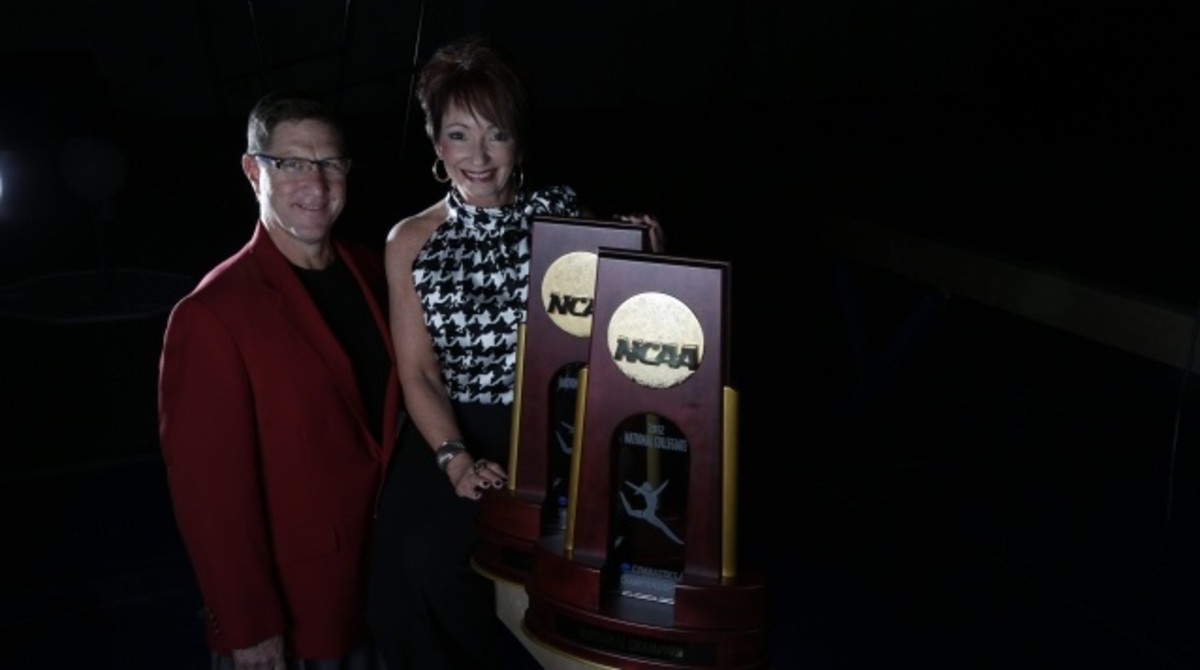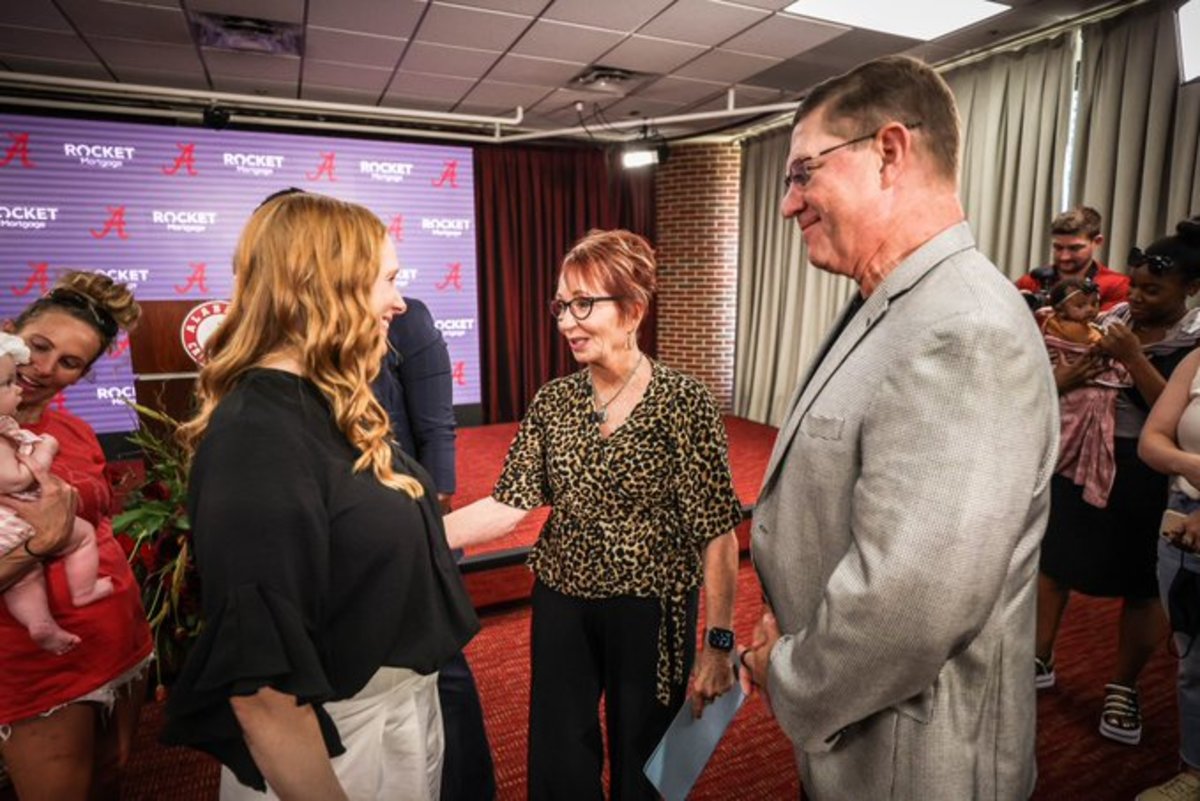How Five Scholarships and $5,000 Changed the Course of Women's Athletics at Alabama

As 2022 winds down, it brings to a close the celebrations of 50 years of Title IX, a law that prohibited sex-based discrimination for any publicly funded schools and institutions, which majorly changed the way women's sports were funded and supported.
The University of Alabama has been highlighting 50 women who impacted women's athletics at the university that you can read about here, but few have had a larger impact than Sarah Patterson.
Alongside her husband David, Sarah spent 36 years as the head gymnastics coach for the Crimson Tide, winning six national championships (1988, 1991, 1996, 2002, 2011 and 2012) and eight SEC championships.
It all started with the faith of an athletic director, five scholarships and a big floor exercise mat.

Back to the beginning
It was 1978, and Alabama gymnastics was on its fifth coach in the last five seasons. Bear Bryant, who served as athletic director in addition to being the head football coach, took a chance on a recent college graduate from Slippery Rock College and gave her a $5,000 salary.
Patterson didn't know it at the time, but Bryant was planning on shutting down the program after her first year. However, she was able to produce a positive season, plus Alabama needed gymnastics for Title IX numbers.
"It was the first time it was a non-losing season," Patterson said. "And so he gave me five scholarships to work with. We recruited five women from all over the place. And those women, in their senior year took us to our first national championship. It wasn’t the one we won, but we qualified. And that was everything, those scholarships that he gave me."
However, it wasn't just the scholarships that helped. Patterson had another bold ask. She needed an adequate floor exercise mat to practice on, which seems like a reasonable request. The main problem— it would cost $5,000, which was equal to her salary at the time.
"I was asking for him to give me $5,000, the same as my salary, to get a floor exercise mat," Patterson said. "We had a men’s wrestling program and they dropped it, and we were tumbling on a red wrestling mat that had a hole in it. And we taped a white “A” over the hole. So I went in to meet with him and asked him. Coach Bryant looked around at me and [administrator] Sam Bailey and said, ‘Sam, give the little lady what she wants.’
Patterson got the mat.
"That was a turning point," Patterson said. "Five scholarships and a real floor exercise mat that had springs underneath it, so things started to turn around.”
Building a fanbase and culture
And turn around they did. Just one decade later, Alabama gymnastics would host and win the 1988 national championship. It was the first NCAA championship for a women's sport at Alabama. (Softball and women's golf have won team titles since.)
But it didn't come easy, and didn't happen overnight. When Patterson first took over the program, the gymnastics program competed in Foster Auditorium. She estimated that the earliest meets would only have around 50 people in attendance. But soon, they began filling up Foster, so she requested to be moved into Coleman Coliseum.
Foster looked full with 3,000 people, but that was just a drop in the bucket inside Coleman.
"We had a big black curtain over the backside of the Coliseum so that you couldn’t see half the seats," Patterson said. "And then we filled that up and had 7,000. But then they’re all sitting up high on one side of the arena. And then at one point, we dropped the curtain."
Patterson's older daughter Jessie Jones, who currently serves as the director of student media at Alabama, remembers seeing the shift.
"I can remember when I was really little, and they used to put up this huge black curtain that would kind of be the backdrop, back when press row was on the floor," Jones said. "If you walked in the Coliseum and looked across the arena, there was this huge black curtain that blocked off a fourth of it to make it seem smaller and to give everything a focal point. And she worked so hard to get that curtain to come down. They didn’t want it. I remember it. She always wanted to give the team the platform she thought they deserved, and she wasn’t going to stop until they had that.”
Legendary Utah gymnastics coach Greg Marsden told her one of the things that would help them fill the coliseum was hosting a national championship and winning it. And the Crimson Tide did just that in 1991 and 1996.
"So people kept coming," Patterson said. "Now, they have all sorts of marketing people, but back in the day, it was me. The one thing I learned from being a senior women’s administrator from 1985 to 1995 in addition to my coaching job was I got to know Pat Summitt. Pat told me that if you’re not willing to market and promote as much as you coach and recruit, you will compete in front of no one. And I thought those words resonated with me, and we worked really hard."
Patterson enlisted the help of the athletes to pass out flyers at the mall and on cars. They’d pass out donuts to students. Anything they could do to get people to Coleman Coliseum.
They marketed it as "Fun Family Fridays." It was cheaper to bring your family to an Alabama gymnastics meet than a night at the movies or other activities. Marketing towards families helped build a culture that still exists in the gymnastics fanbase today.
It was almost another decade later after winning its first national championship when Alabama finally sold out Coleman Coliseum with over 15,000 fans in attendance for a women's collegiate gymnastics meet between the Crimson Tide and Georgia.
"’ll never forget," Patterson said. "They told me the stands were full before we marched out, and that they were turning people away. There were dads that had promised their children they were going to take them to meet, and they got there and there were no tickets. People were actually scalping the tickets outside of Coleman. Someone called and said, ‘We need to delay the meet. There’s cars all the way back to DCH.’
"When the lights went down and then they came back up after we did the intros, and I looked up and I saw the fans and the stands being completely full, I think that was one of the highlights of my career. That meant more than winning a championship.”
That was the first of many sellouts to come. In the year since, 15,000-plus people have poured in to Coleman Coliseum multiple times to watch Alabama gymnastics.
Alabama, Georgia and Utah were the pioneers of fan engagement and large crowds in collegiate gymnastics. But in recent years, programs like LSU, Florida, Kentucky and Auburn have all experienced sellouts and huge crowds in their own arenas. Seeing that makes Patterson's heart soar.
It's a legacy and culture that has carried over to other women's sports at Alabama, like soccer, which sold out the Alabama Soccer Stadium for the Elite Eight matchup in the NCAA Tournament against duke. Or softball, which experienced multiple sellouts in 2022 at Rhoads Stadium. Patterson's younger daughter, Jordan, was on the Alabama softball team from 2011 to 2014. Jordan was on the 2012 national championship team with softball, and the Pattersons have been avid supporters of Alabama softball ever since.
"I have great seats at Rhoads Stadium, and when I walk in and see that place full, especially this past year, I thought back to how did we ever make this happen?" Patterson said. "It was a fight. How do you make the fight? I just tried to do it in a way that was not necessarily combative. But more in a way of, you have two men’s sports that are flying charter flights. OK, we need two women’s sports that fly on charter flights."
Patterson worked under nearly a dozen athletic directors throughout her tenure at Alabama, and she said it was all about finding the right moment to go in and talk to them.
"There was a couple of the athletic directors that my voice to them was, “You have a grandson. You have a granddaughter. Don’t you want the same thing for your granddaughter as you do your grandson?’" she said. "So it was a fight for everything, but I tried to do it in a way that made sense to people."
Ever-encouraging presence
If any Crimson Tide team has a big win, you can likely expect a congratulatory tweet coming from Patterson shortly after. Or you might even see her in the stands.
Instead of moving to the beach or mountains for retirement, the Pattersons stuck around in Tuscaloosa. Even after retiring from coaching in 2014, Patterson frequents Alabama sporting events and is often found at Rhoads Stadium.
"The day-to-day might be done, but they still love all those people," Jones said. "From the athletes to the people they worked with, that didn’t end.”
Jones said she always felt like she had bonus big sisters growing up and has many women she considers family that were part of the Alabama gymnastics program. When she got married in 2008, more gymnastic alumni came than she could have ever imagined.
Starting in January, Alabama gymnastics officially enters a new chapter when Ashley Priess Johnston will coach her first meet as just the third different Crimson Tide gymnastics head coach in the last 40 years.
Johnston was a gymnast at Alabama under the Pattersons from 2009 to 2013 and was a part of two national championship-winning teams in 2011 and 2012. Throughout her transition to head coach, the Pattersons have been there every step of the way and will no doubt be in the stands at Coleman Coliseum supporting her and the team this season.
"While I definitely lean on them for support and guidance, that's nothing new to me," Johnston told BamaCentral back in June. "I've been doing that for my entire coaching career. And so really, they've taken on that same role where they're just supportive, have let me know that if if I need anything, they're there for me, but ultimately, they're the biggest cheerleaders the biggest support system to back me along this journey.”

Patterson also has given back to the Tuscaloosa community in a major way. She launched the Power of Pink meet in 2005 to raise awareness for breast cancer. Over 250,000 fans have attended pink meets in Tuscaloosa since then. It also led to the creation of the DCH Breast Cancer Fund, which promotes awareness and provides screenings to those who may not be able to afford otherwise. According to Patterson, the fund has raised over $3 million.
Alabama is where legends are made, and Patterson has no doubt cemented herself as a legend, not just for the championships she won, but for the legacy and culture she built for women's athletics at Alabama.
The former said she always gets asked about the championships and the rings, but the most important things to her are watching the athletes go on to succeed in life after gymnastics and the impact that she has been able to have on the community.
"Those are the true treasures of our 36 years coaching.”
Get your Crimson Tide basketball tickets from SI Tickets HERE
